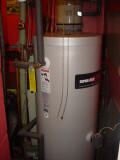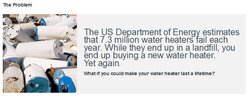Hello WoodGeek
Here is a review of the air tap
See

>
http://www.amazon.com/Airgenerate-A7-AirTap/dp/B001AMU09S
This review is from: AirTap A7 (Misc.)
Though I didn't purchase my Airtap through Amazon, I thought it would be worthwhile to share my experiences here, since I haven't seen too many reviews on the web.
First, my Airtap has been installed for almost two weeks. It came boxed up securely, and arrived with no damage. I paid $699 with free shipping, though I have seen it since for $599 with free shipping. I originally started with a 50-gallon (new) Whirlpool water heater with factory-installed nipples. These were a nightmare to remove (necessary in order to install the Airtap). I ended up exchanging this tank for a smaller (40-gallon) one that didn't have pre-installed nipples.
Installation, other than described above, was relatively easy. Incoming water temperature was 49 degrees, and it took the airtap about 2.5 hours to bring the water up to 115 (my original temperature setting). I soon realized that this unit does not maintain a constant temperature in the tank; rather, it keeps it within a 15 degree range (turns on when the temperature get to 15 degress below the set point). My first shower after some laundry, dishes, etc. was warm, but not hot. I realized that this is because it was at the lower end of the temp range (probably about 100 degrees) due to it turning on just as I started my shower.
I turned the thermostat up to 130 at the recommendation of the manufacturer, and it has helped tremendously. I am generally happy with this product due to it's energy savings. If you are considering one, there are a few things to keep in mind:
1. This doesn't keep your water at a constant temperature, and you may find the temp less than ideal, even after sitting unused all day or night.
2. The recovery time is much longer than with the electric elements/gas burner, which could cause problems if you plan on several showers/high demand in a short period of time.
3. It does make noise when running, so if you are bothered by noise, this may not be for you.
4. Though I couldn't find any stamp on the unit, after reading about it and seeing the printing style on the box, this appears to be yet another product imported from China.
I would recommend a larger tank to allow for more storage (around 80 gallons). This would probably alleviate hot water shortages to some extent.
Overall, I would recommend this water heater. There are others on the market, too. The Airtap seems to be well designed and built, and it should pay for itself in enegy savings in less than a year. We will have to see how durable it is in the long run, though. Just be aware of the few quarks (above) as compared to your existing water heater, and I'm sure you'll find it adequate, though it may leave you out of hot water occasionally. I guess it could takes a little adjustment to the typical American "I want it now" lifestyle.
I heat my home with free wood, so the heat used to heat the water in the winter is also free. Keep in mind that if you use gas, oil, propane or electric to heat your home, you are using this heat that you already paid for once to then heat your water; you are essentially paying to heat the air and then paying to transfer the heat into the water, though it is still much more efficient than using electric elements.
On the other hand, in the summer, you can look at it as using hot air that your AC would normally dump outside to heat your water - basically "free" hot water in the summer (or free air conditioning, however youwant to look at it).
Hope this helps







